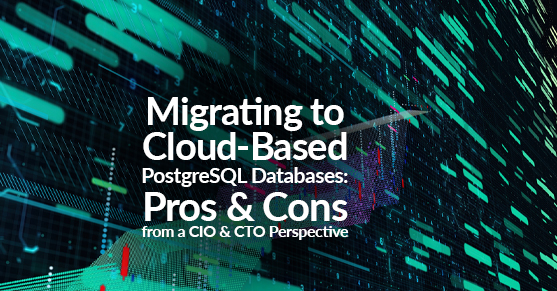As companies look to improve their technology infrastructure and reduce costs, many are considering migrating from traditional on-premises databases like Oracle to cloud-based databases like AWS Aurora, Amazon RDS for PostgreSQL, or Azure Database for PostgreSQL. In this article, we’ll discuss the advantages and disadvantages of making this switch from a CIO and CTO perspective.
Advantages of Migrating to Cloud-Based Databases
- Scalability: Cloud-based databases offer scalability, which means that companies can add or reduce resources as needed. This flexibility allows for faster application development and deployment, as well as quicker scaling up or down.
- Cost-Efficiency: With traditional on-premises databases, companies are responsible for purchasing and maintaining hardware, as well as managing and troubleshooting the database itself. Migrating to a cloud-based database can reduce or eliminate these costs, as the cloud provider takes care of hardware maintenance and management.
- Advanced Features: Cloud-based databases offer advanced features and capabilities that are not available with traditional databases. For example, AWS Aurora offers multi-master replication, while Amazon RDS for PostgreSQL and Azure Database for PostgreSQL provide advanced analytics and machine learning capabilities.
- Better Performance: Cloud-based databases are often optimized for performance, providing faster response times and improved efficiency.
- Better Disaster Recovery: Cloud-based databases often provide better disaster recovery options, allowing companies to recover quickly in the event of an outage or other issue.
Disadvantages of Migrating to Cloud-Based Databases
- Security: One of the main concerns of migrating to a cloud-based database is security. Companies are entrusting their data to a third-party provider, which can be a potential risk. However, cloud providers invest heavily in state-of-the-art security measures to protect your data, and you can take steps to ensure your data remains secure.
- Learning Curve: Migrating to a new platform can be challenging, and your IT team will need to learn how to work with the new database. However, cloud providers often provide extensive documentation and support to help make the transition as smooth as possible.
- Customization: Traditional on-premises databases often allow for more customization, while cloud-based databases may be more limited. However, cloud providers are constantly improving their platforms, and many customization options are now available.
Conclusion
Overall, migrating from Oracle to cloud-based databases like AWS Aurora, Amazon RDS for PostgreSQL, or Azure Database for PostgreSQL can be a smart business decision. The advantages of scalability, cost-efficiency, advanced features, better performance, and better disaster recovery can outweigh the potential disadvantages of security concerns, a learning curve, and limited customization options. With the right planning and execution, migrating to a cloud-based database can provide significant benefits for your business.
Contact us with any questions and see what our managed DBA services can do for your business!

